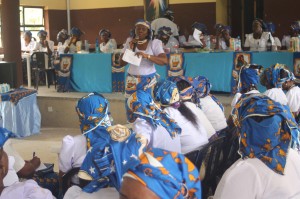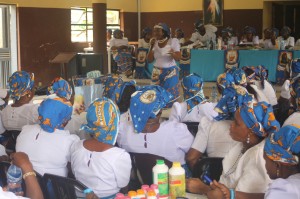“Women’s access to clean cooking fuels is a human right!” That is the central theme of Spaces for Change’s Gender and Energy Policy Research Campaign, which flagged off on August 2, 2015. Hosted in collaboration with the Catholic Women Organization (Ipaja Deanery), 305 women participated in the event. Through this campaign, Spaces for Change is providing well-researched and evidence-based information that will enable women across Nigeria, in rural and urban areas, to make informed choices about the cooking fuels that they use, at home, and in their businesses.
52% of Nigerians have no access to electricity, and have limited access to other sources of energy. Poor access to energy supply contributes to the record-high levels of poverty and underdevelopment. In performing their traditional gender roles, women have more need for energy for domestic use such as cooking, heating, laundry, cooling, lighting, storage etc. As such, they bear a significant share of the burden of energy poverty; a situation compounded by lower literacy levels among women and income inequalities. 2010 National Literacy Survey conducted by the National Bureau of Statistics show that the overall adult literacy rate (calculated based on ability to read and write in English or any other languages) was 71.6 per cent. The overall adult literacy rate among the males was 79.3 per cent while that of females was 63.7 per cent. Similarly, UNDP rates Nigeria’s income inequality between men and women quite low at 152nd position out of 182 countries surveyed. When women in for 148 countries surveyed have their goals of empowerment, literacy and labour market participation eroded by gender inequality, disproportionately high levels of poverty among women remains a harrowing reality.
Cooking fuels in Nigeria are primarily derived from biomass resources which include firewood, charcoal, grasses, sawdust, shrubs, residues and wastes. Fuel wood is the most popularly-used for domestic and commercial cooking. It is believed that mainly the poor in rural and urban areas use firewood, but this does not seem to be true. Spaces for Change’s findings show that firewood use has strong cultural underpinnings. Preliminary research findings show that many use firewood because they believe firewood makes meals tastier. Others believe that it burns faster than other cooking fuels. Choice and usage are primarily determined by availability, accessibility and affordability, with minimal considerations given to the impacts on human health and the environment. The main focus of Spaces for Change’s campaign is to highlight these impacts, and provide evidence for implementing reforms in ways that overturn the structures of disempowerment and inequality.
Also popularly used for cooking are kerosene stoves, green stoves, liquified petroleum gas (LPG) and electric hot plates. Overall, firewood continues to dominate as the main source of cooking energy for the majority of women in Nigeria. Biomass burning has both short- and long-term impacts on humans and on the environment. The Stockholm Environment Institute has found that black carbon (soot) emissions from the burning of traditional biomass for household cooking are responsible for an estimated 18 per cent of global GHG emissions. As the United National Environmental Programme also finds, increased usage of biomass fuels can have numerous adverse health outcomes and elevate mortality risks. The adverse health outcomes usually result from burns; fumes cause indoor air pollution; fumes can cause poisoning and chemical pneumonia from non-intentional ingestion by children; fumes also cause visual impairments.
When these accidents result, women incur additional costs on medication, hospitalization and childcare due to increased risk of complications during pregnancy, childbirth and stronger likelihood of deformities in children. Because of women’s traditional role within the family as care givers, their ability to generate income is reduced as a result of long hours and time spent on taking care of sick children or injured family members. Deforestation is another long-term consequence of biomass burning that impact on the environment, and contributes to climate change.
LPG and green cook stoves have great health benefits for women. Women, especially those with low income and young children, are however, concerned about the high cost of cooking-gas appliances, and the extreme care required to avoid domestic accidents. The persistence of fuel scarcity is also a major concern. Scarcity of petroleum products puts additional pressure on women’s performance of their traditional family roles. Productive hours usually spent on petty trading, farming, artisan and informal economic activities are lost during the long time spent on fuel queues, which significantly impacts on maternal health and incomes generated during this period.
Spaces for Change will continue to hold monthly interactions focusing on clean cooking fuels with women groups across the country, to allow us to extract a wide range of potential lessons for future reformers. Improved analysis of the household choice of cooking fuels and stoves can inform energy reform policies, build the evidence for switching to cleaner fuels and influence interventions designed to address the health, socioeconomic and environmental impacts of the energy sector.







